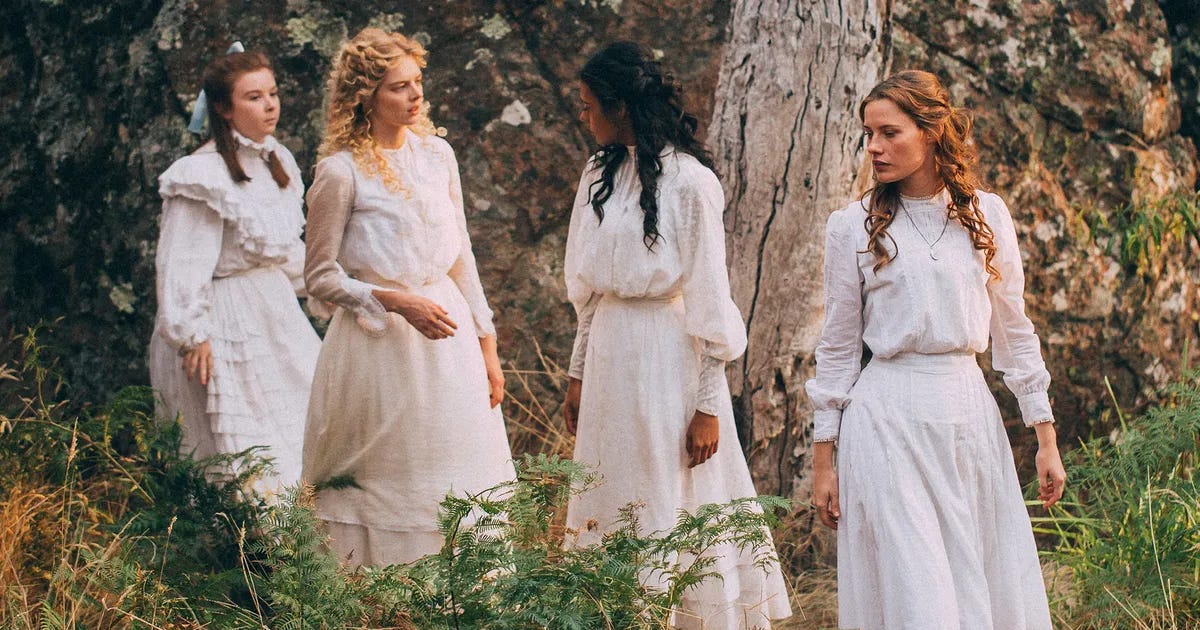The students of Appleyard College will never be unburdened by what has been. Or at least that’s my takeaway from Picnic at Hanging Rock, a movie I somehow managed to not see until the year 2024.
Before I go on, however, I just want to share a realization I had last week. When I started this Substack I had intended for these posts to be personal, less story/criticism driven. It’s been years since I’ve done any formal review work, and as a result I’ve found myself getting imposter syndrome any time I’ve tried to put a thought—one that someone much smarter has likely articulated before me—together. That being said, I’ve fallen into that trap (now out in theaters) anyway, and I’m now making a concerted effort to stop. I just want to write about ME. ME watching MOVIES. And how ME feels afterwards.
—
These past few weeks I’ve had an anxiety flare-up. This sometimes happens in the summer, and a therapist once explained to me the phenomenon is more commonplace than I had imagined. In the winter he sees the expected influx of new depression patients, but the long days of the summer months often bring him another kind of cuckoo (now out in theaters). The anxious kind! The manic kind! The mood disorder-y kind! So while there may be this seasonal thing I suffer from, it doesn’t help that I’ve also been unemployed for the past two years. I’ve had no real structure in my life, only the suggestion of structure I boast about to my friends and family so they believe I’m everything but idle.
I do happen to have a few things cooking (keep an eye out, employers), but I have no idea when dinner will be ready. And this is what wrecks me. I’ve had to sit with unresolved conflict for so long now. As the roadblocks in my choice of career become increasingly omnipresent, I—and so many of my peers—have naturally grown existential over the sustainability of the service we provide.
This stress, at its core, is all that chronic anxiety ever is—an obsession with an endpoint, with certainty or knowledge in the hopes that having it will open the floodgates to power, safety, or security. Anxiety is always looking for answers, sometimes where there aren’t any available quite yet, other times when they’ll never be available. So of course, I found the ending of Peter Weir’s masterpiece apt. It’s as unsettling as it is because it is an un-resolution, and Hanging Rock challenges viewers to swallow an anti-climax. To watch a movie that is satisfyingly unsatisfying.
I somehow managed to watch it not knowing where it was going, not knowing that the four people who go missing at its open, stay missing. It was thrilling. A lesser movie would eventually explain away the mystery—it was aliens, lust, religion, and/or probably lesbianism that took away the three young girls (and one teacher). A lesser movie would have closed the door. A lesser movie wouldn’t have imprinted itself in the minds of so many fans.
Rather than fixate on what happened, Hanging Rock chooses to focus on those who were left scared but unscathed by the disappearance. It stays with their disappointment, their thirst for answers and justice, and it’s as menacing as it is because of this search. The fate of the missing girls soon becomes background to a greater horror. The victims are the ones who have to cope with a nightmare that will remain perpetually opaque to them.
That’s real haunting, and Hanging Rock reminded me of what, in life and in movies, actually gives me real, long-lasting scares. It’s rarely the jumpy moments or physical violence. It’s rarely even a villain. It’s confusion, uncertainty, and feeling destabilized by all that can’t be explained.
It may be clichéd, that everything can be reduced to a fear of death, you know, The Big Bad of Unknowns, but it’s a cliché for a reason. In some way or another this fear takes ahold of me every year, sometimes a few times a year. But I at least can do something that no one is this funky Australian movie can. Accept the mystery, move on.




